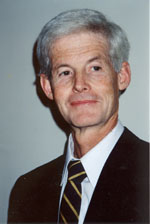Stephen A. Cook (Toronto)
[ français ]
(see detailed menu on the right)
CRM-Fields Prize 1999 : Stephen A. Cook
 The CRM-Fields Prize was awarded to Stephen A. Cook from the University of Toronto. Dr. Cook's principal research area is computational complexity, with excursions into programming language semantics, parallel computation and especially the interaction between login and complexity theory. The CRM-Fields Prize was awarded to Stephen A. Cook from the University of Toronto. Dr. Cook's principal research area is computational complexity, with excursions into programming language semantics, parallel computation and especially the interaction between login and complexity theory.
Dr. Cook's principal research area is computational complexity, with excursions into programming language semantics, parallel computation and especially the interaction between login and complexity theory.
He has authored over 50 research papers, including his famous 1971 paper, "The Complexity of Theorem Proving Procedures," which introduced the theory of NP completeness.
Dr. Cook was the 1982 recipient of the Turing award, and was awarded a Steacie Fellowship in 1977 and a Killam Research Fellowship in 1982. He received computer science teaching awards in 1989 and 1995.
He is a fellow of the Royal Society of Canada and was elected to membership in the National Academy of Sciences (United States) and the American Academy of Arts and Sciences.
Stephen A. Cook received his PhD from Harvard University in 1966. From 1966 to 1970 he was an Assistant Professor at the University of California, Berkeley. He joined the University of Toronto in 1970 as an Associate Professor and was promoted to a Professor in 1975.
Dr. Cook was the 1982 recipient of the Turing award, and was awarded a Steacie Fellowship in 1977 and a Killam Research Fellowship in 1982. He received computer science teaching awards in 1989 and 1995.
He is a fellow of the Royal Society of Canada and was elected to membership in the National Academy of Sciences (United States) and the American Academy of Arts and Sciences.
Conference abstract presented on November 19, 1999:
"We present an historical overview of computational complexity theory. The emphasis is on the importance, plausibility and difficulty of the conjecture that P is not equal to NP, which Steve Smale listed as one of the top three mathematical problems for the next century."
webmaster@crm.umontreal.ca
|